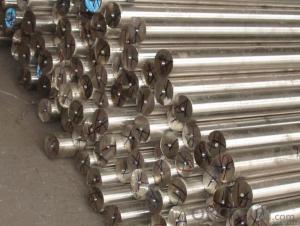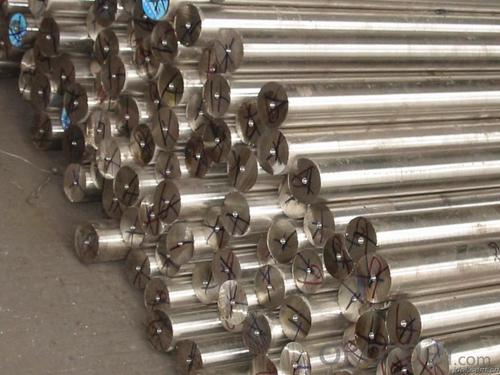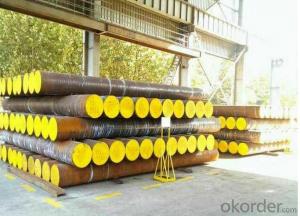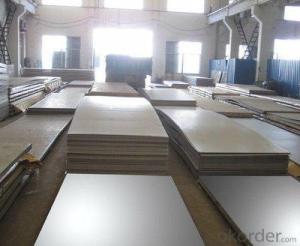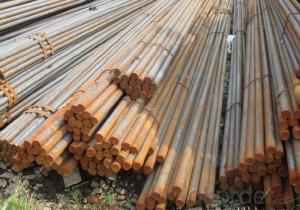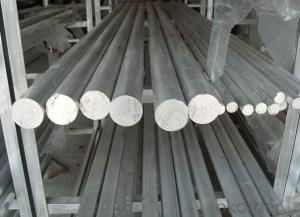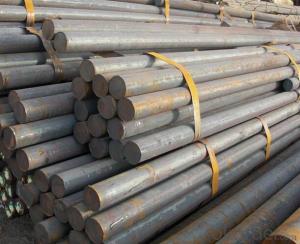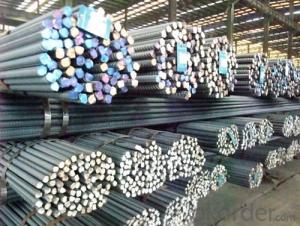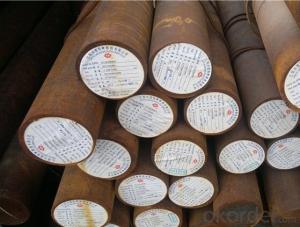Special Steel 17crnimo6 Gear Steel Alloy Steel
- Loading Port:
- China main port
- Payment Terms:
- TT OR LC
- Min Order Qty:
- 25 m.t.
- Supply Capability:
- 10000 m.t./month
OKorder Service Pledge
OKorder Financial Service
You Might Also Like
Specification
17crnimo6 gear steel
Material: | 17CrNiMo6 |
Diameter: | 10mm-1200mm |
Length: | 3000mm-12000mm Straightness: 3mm/M max |
Process: | EAF + LF + VD + Forged + Heat Treatment (optional) |
Delivery condition: | Hot forged +Rough machined (black surface after Q/T)+ Turned (optional) |
Delivery Time: | 30-45 days |
MOQ: | 10 tons |
Heat treatment: | Normalized / Annealed / Quenched / tempered |
Technical Data: | According to the customer's requirement of Chemical Composition, Physical Properties and Mechanical Testing |
Test: | Ultrasonic test according to SEP 1921-84 G3 C/c |
Marking: | Grade, heat NO. length will be stamped one each bar with required color |
Payment: | 30% advance by T\T; Balance pay before the shipment against shipping documents or irrevocable LC at sight |
Application: | Statically and dynamically stressed components for vehicles, engines and machines. For parts of larger cross-sections, crankshafts, gears. |
Product show:

Workshop show:

FAQ:
1, Your advantages?
professional products inquiry, products knowledge train (for agents), smooth goods delivery, excellent customer solution proposale
2, Test & Certificate?
SGS test is available, customer inspection before shipping is welcome, third party inspection is no problem
3, Payment Terms?
30% TT as deposit and 70% before delivery.
Irrevocable L/C at sight.
4, Trading Terms?
EXW, FOB, CIF, FFR, CNF
5, After-sale Service?
We provides the services and support you need for every step of our cooperation. We're the business partner you can trust.
For any problem, please kindly contact us at any your convenient time.
We'll reply you in our first priority within 24 hours.
- Q: What are the challenges in manufacturing special steel?
- Some of the challenges in manufacturing special steel include the high cost of raw materials, the complex and precise production processes, ensuring consistent quality and performance, meeting specific customer requirements, and staying up-to-date with rapidly advancing technologies and industry standards. Additionally, the demand for customization and shorter lead times can also present challenges in terms of production planning and logistics.
- Q: How does special steel perform in extreme heat conditions?
- Special steel is specifically designed to perform exceptionally well in extreme heat conditions. It exhibits high resistance to thermal fatigue, oxidation, and creep, making it suitable for applications that involve exposure to intense heat. The unique composition and processing techniques used in the production of special steel allow it to retain its mechanical properties and structural integrity even at elevated temperatures. One of the key characteristics of special steel is its high melting point, which prevents it from melting or deforming easily under extreme heat. This property is crucial in industries such as aerospace, power generation, and automotive, where components are subjected to intense heat and need to maintain their shape and functionality. Furthermore, special steel possesses excellent heat resistance, meaning it can withstand and dissipate heat effectively without losing its strength or becoming brittle. This property ensures that the steel remains durable and reliable even when exposed to prolonged high-temperature environments. Special steel also exhibits outstanding oxidation resistance, forming a protective layer on its surface that prevents it from corroding or degrading when exposed to oxygen at high temperatures. This resistance to oxidation allows special steel to maintain its performance and structural integrity over extended periods, making it highly suitable for applications in extreme heat conditions. In summary, special steel performs exceptionally well in extreme heat conditions due to its high melting point, heat resistance, and oxidation resistance. Its ability to withstand thermal fatigue, oxidation, and creep makes it a reliable and durable choice for applications that require superior performance in high-temperature environments.
- Q: What are the properties of corrosion-resistant steel?
- Corrosion-resistant steel, also known as stainless steel, possesses several key properties. Firstly, it exhibits a high resistance to corrosion, making it resistant to rust and other forms of degradation caused by moisture and exposure to various chemicals. This type of steel also has a high strength-to-weight ratio, enabling it to maintain its structural integrity even under extreme conditions. Additionally, corrosion-resistant steel is highly durable and has a long lifespan, making it a reliable choice for applications requiring longevity. It is also aesthetically appealing, with a smooth and polished surface finish. Overall, the properties of corrosion-resistant steel make it a versatile and reliable material for a wide range of industrial, architectural, and consumer applications.
- Q: Can special steel be used in aerospace turbine components?
- Aerospace turbine components, like blades, vanes, and disks, need strong materials to withstand tough conditions. Special steel, also known as high-performance alloy steel, fits the bill. It has excellent mechanical properties, like high strength, hardness, and temperature resistance. These qualities make it perfect for aerospace turbine components, which face extreme temperatures, pressures, and stress. Jet engines rely on turbine components to work properly, so they need materials that can handle the tough conditions. Special steel alloys, like nickel-based superalloys, are commonly used because they can maintain their strength and integrity at high temperatures. Plus, special steel is lightweight but strong, so it helps make durable yet light turbine components. This improves the efficiency and performance of aerospace systems. Special steel alloys also resist corrosion, oxidation, and fatigue, which are crucial for the long-term reliability and safety of turbine components. These materials go through rigorous testing and certification to meet aviation industry standards. In conclusion, special steel is a great choice for aerospace turbine components. Its exceptional mechanical properties and resistance to extreme conditions make it reliable and safe. It plays a vital role in ensuring the efficiency and safety of turbine systems in aerospace applications.
- Q: How does special steel perform in cryogenic applications?
- Special steel is known for its excellent performance in cryogenic applications. Cryogenic temperatures refer to extremely low temperatures below -150 degrees Celsius (-238 degrees Fahrenheit). In such conditions, regular steel tends to become brittle and lose its strength, making it unsuitable for use. However, special steel, also known as cryogenic steel or low-temperature steel, is specifically designed to withstand these extreme cold temperatures. One of the key properties of special steel is its ability to maintain its mechanical properties even at cryogenic temperatures. It retains its strength, toughness, and ductility, ensuring that it can withstand the stresses and strains imposed on it in cryogenic environments. This allows special steel to be used in various applications, such as cryogenic storage tanks, pipelines, and equipment in industries like aerospace, energy, and healthcare. Special steel also exhibits excellent resistance to brittle fracture at low temperatures. This is crucial, as brittle fractures can occur when materials become too brittle and fail under stress. The unique composition and processing of special steel help prevent this, ensuring the integrity and safety of components in cryogenic systems. Moreover, special steel has a low coefficient of thermal expansion, meaning it experiences minimal dimensional changes when exposed to temperature variations. This property is highly advantageous in cryogenic applications, as it helps maintain the stability and reliability of equipment and structures. In addition, special steel offers good corrosion resistance, which is essential in cryogenic environments where the presence of moisture and certain chemicals can accelerate corrosion processes. The resistance to corrosion ensures the longevity and durability of components, reducing maintenance and replacement costs. Overall, special steel is a preferred choice for cryogenic applications due to its ability to maintain mechanical properties, resistance to brittle fracture, low thermal expansion, and corrosion resistance. These properties make it a reliable and efficient material for use in cryogenic systems, providing the necessary strength and durability even in extremely low-temperature conditions.
- Q: How does special steel perform in high-temperature creep resistance?
- The outstanding performance of special steel in resisting high-temperature creep is well-known. Creep refers to the tendency of a material to deform or strain under constant stress when it is subjected to elevated temperatures. Ordinary steels may experience notable creep under such conditions, which can result in a decrease in their mechanical properties and potential failure. However, special steels are specifically engineered to endure high-temperature creep, making them extremely suitable for applications where resistance to time-dependent deformation is crucial. These steels are frequently alloyed with elements like chromium, molybdenum, and vanadium, which enhance their properties at high temperatures. The alloying elements present in special steels create stable carbides and nitrides, which serve as strengthening agents. They hinder grain growth and prevent dislocation movement, thereby leading to improved creep resistance and structural stability even in extremely high temperatures. Moreover, special steels often undergo heat treatment processes like quenching and tempering, which further enhance their resistance to creep and overall mechanical performance. Additionally, the microstructure of special steels is meticulously controlled during the manufacturing process to ensure optimal resistance to creep. Typically, fine-grained structures with a high concentration of precipitates or second-phase particles are developed. These structures impede dislocation movement and enhance creep strength. To summarize, special steels possess exceptional resistance to high-temperature creep due to their alloying elements, heat treatment processes, and controlled microstructures. They can withstand prolonged exposure to elevated temperatures without significant deformation or loss of mechanical properties, making them indispensable in industries such as aerospace, power generation, and petrochemicals where high-temperature applications are prevalent.
- Q: How does special steel contribute to improving product resistance to environmental factors?
- Special steel contributes to improving product resistance to environmental factors through its unique properties. Special steels are engineered to have superior strength, corrosion resistance, and durability, allowing them to withstand harsh environmental conditions such as extreme temperatures, moisture, and chemical exposure. These enhanced properties enable products made from special steel to have a longer lifespan, reduced maintenance requirements, and increased performance in challenging environments. Ultimately, special steel helps to enhance product reliability and longevity, making it an essential material for improving resistance to environmental factors.
- Q: How does heat-resistant steel perform in high-temperature applications?
- Heat-resistant steel performs exceptionally well in high-temperature applications. It exhibits remarkable strength and stability, allowing it to withstand extreme heat without losing its structural integrity or mechanical properties. This type of steel maintains its resistance to oxidation, corrosion, and creep, making it an ideal choice for various industries such as aerospace, power generation, and petrochemical. Its ability to retain its strength and shape under extreme heat conditions makes it a reliable material for applications where high temperatures are involved.
- Q: What industries use special steel?
- There are several industries that rely on special steel for their operations. One of the significant sectors that utilize special steel is the automotive industry. Special steel is used in the manufacturing of various automotive components such as engine parts, transmission systems, and chassis components. The high strength, durability, and corrosion resistance of special steel make it ideal for the demanding conditions that automotive components are subjected to. The aerospace industry is another sector that extensively uses special steel. Special steel is used in the construction of aircraft structures, engine components, and landing gear systems. The lightweight yet strong properties of special steel are crucial in ensuring the safety and performance of aircraft. The energy sector also relies on special steel for its operations. Special steel is used in the production of equipment for oil and gas exploration, including drilling rigs, pipelines, and offshore platforms. The high-strength and corrosion-resistant properties of special steel are essential in withstanding the harsh operating conditions in the energy industry. The construction industry is another significant consumer of special steel. It is used in the manufacturing of structural components, reinforcing bars, and precast concrete products. Special steel provides the necessary strength and durability required for building structures that can withstand various environmental conditions and loads. The manufacturing and machinery industry also use special steel in the production of heavy machinery, industrial equipment, and machine tools. The high strength, wear resistance, and heat resistance properties of special steel make it suitable for the demanding requirements of these applications. Additionally, the defense and military industry rely on special steel for the production of military vehicles, weapons, and armor. Special steel's ability to withstand extreme conditions and provide protection makes it a critical material in this industry. Overall, special steel finds its applications in various industries due to its exceptional properties of strength, durability, corrosion resistance, and heat resistance. Its usage spans across automotive, aerospace, energy, construction, manufacturing, and defense sectors, where reliability and performance are paramount.
- Q: What are the applications of special steel in the agriculture sector?
- Special steel has various applications in the agriculture sector due to its exceptional properties such as durability, corrosion resistance, and strength. It is used in the manufacturing of farm equipment and machinery like tractors, plows, harrows, and combine harvesters. Special steel is also utilized in the construction of storage silos, irrigation systems, and animal housing structures. Additionally, it is employed in the production of cutting tools and blades for efficient crop harvesting and maintenance.
Send your message to us
Special Steel 17crnimo6 Gear Steel Alloy Steel
- Loading Port:
- China main port
- Payment Terms:
- TT OR LC
- Min Order Qty:
- 25 m.t.
- Supply Capability:
- 10000 m.t./month
OKorder Service Pledge
OKorder Financial Service
Similar products
Hot products
Hot Searches
Related keywords
